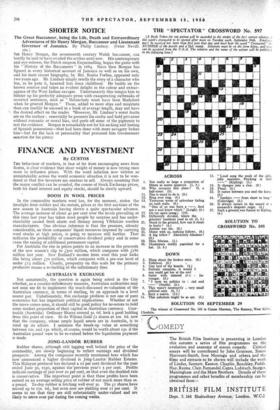FINANCE AND INVESTMENT
By CUSTOS
Tin behaviour of markets, in face of far from encouraging news from Korea, is clear evidence that sheer weight of money is now trying once more to influence prices. With the word inflation now written so unmistakably across the world economic situation it is not to be won- dered at that few investors are anxious to sell. Always assuming that the major conflict can be avoided, the course of Stock Exchange prices, both for fixed interest and equity stocks, should be slowly upward.
BOOM IN WOOL PRICES In the commodity markets wool has, for the moment, stolen the limelight from rubber and the metals, prices at the first auctions of the new season in Australia having shown a quite spectacular advance. The average increase of about 40 per cent over the levels prevailing at this time last year has taken most people by surprise and has under- standably caused fr6sh alarm and dismay among Y8rkshire woollen manufacturers. One obvious inference is that the pressure, already considerable, on these companies' liquid resources imposed by carrying wool stocks at high prices, is going to increase still further. That indicates the probability of conservative dividend policy and in some cases the raising of additional permanent capital.
For Australia the rise in prices points to an increase in the proceeds of the new season's clip to L5oo million, • which compares with 4286 million last year. New Zealand's income from wool this year looks like being about L7o million, which compares with a pre-war level of under Li3 million. Clearly, prosperity on this scale for the primary producers means a re-fuelling of the inflationary fires.
AUSTRALIA'S EXCHANGE
Not unnaturally, the question is again being asked in the City whether, as a counter-inflationary measure, Australian authorities may not soon see fit to implement the much-discussed re-valuation of the Australian currency, in terms of sterling, by an approach to a level nearer par. Unfortunately, this exchange problem is not one of pure economics but has important political implications. Whether or not the move comes soon, it should still be good policy for investors to hold some modest proportion of their capital in Australian currency. Cour- taulds (Australia) Ordinary Shares around 55. 6d. look a good holding from this point of view. So do Wiluna Golctti shares at los. 6d. now that the company, whose ample liquid assets are in Australia, is to wind up its affairs. I estimate the break-up value at something between I2S. and 135. which, of course5 would be worth about 15s. if the Australian pound were to be re-valued before the liquidation payment is made.
-JONG-LAND OR RUBBER
Rubber shares, although still lagging well behind the price of the commodity, are slowly beginning to reflect earnings and dividend prospects. Among the companies recently mentioned here which has now announced a higher dividend is Jong-Landor! Rubber Estates. This Malayan producer has declared a so per cent dividend for the year ended June 30, I950, against the 'previous year's 5 per cent. Profits indicate earnings of just over 20 per cent, so that even the doubled rate is conservative. The important point is that these profits have been earned on an average selling price of rubber of not much more than Is. a pound. To-day rubber is fetching well over 3s. The LI shares have moved up to 578. 6d; but even now are yielding over ri per cent. It seems to me that they are still substantially under-valued and are likely to move over par during the coming weeks.






















 Previous page
Previous page